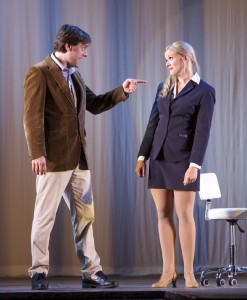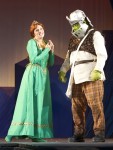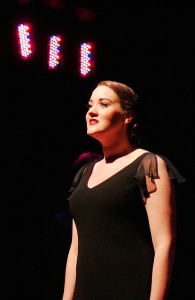When Fiona (Lindsay Warnock) asks her savior to take off his helmet so that she can meet her prince, Shrek (Matt Palmer) is reluctant. (photo by Milan Radovanovic)
An ugly ogre and a beautiful blonde. You wouldn’t think they’d have much in common, but the similarities stand out when you see Shrek: The Musical and Legally Blonde: The Musical back to back, as the Jewish Independent did this month at Theatre Under the Stars.
In Shrek, the title character was sent out into the world by his parents at age 7. A brave, kind, generous soul, he is feared and harassed (think pitchforks and torches) for his gruesome exterior. He chooses to live in an isolated swamp, alone. But, when Lord Farquaad exiles all the fairy-tale creatures from Duloc – because they are different/special/freaks – they end up in Shrek’s backyard. In need of a hero, they ask for Shrek’s help, which he provides, despite his complaining, because that’s just who he is. Unwillingly accompanied by his soon-to-be best buddy and faithful sidekick Donkey, who is also fleeing Farquaad’s soldiers (because he can talk – and talk he does), Shrek travels to Duloc. There, he makes a deal with Farquaad, who is also in need of a hero – to retrieve Princess Fiona, who has been locked in a dragon-guarded tower by her parents, who assure her that, one day, her prince will come. Farquaad’s intentions are anything but noble, however, and Shrek must ultimately save Fiona from her prince.

In Legally Blonde, we have Elle. When the musical begins, Elle has her prince and they are set to live happily ever after; that is, until her prince, Warner, dumps her to go to Harvard Law School, where he hopes to find a more serious and appropriate wife for someone of his station. A smart, caring and optimistic soul, she is ridiculed and discounted for her attractive exterior. Instead of running away, as did Shrek initially, Elle fights back, putting her nose to the books and getting into Harvard so that she can show Warner just how serious she is. While she doesn’t have to fend off dragons and soldiers, she must defend herself against unwanted advances and prove herself worthy, not only to her fellow lawyers but to herself. She, like Shrek, doesn’t have to fight alone, but is supported by a trio of besties from back home (who most often appear as a figment of her imagination, as her own Greek chorus, supplemented by other Delta Nu sorority sisters) and a new friend, Paulette. As must the fairy-tale creatures, Paulette also must find her voice, the confidence to stand up for herself and her rights.
Both age-old stories of finding the courage to be oneself, and proudly so, are creatively and humorously told. Though Shrek drags a bit in parts and Legally Blonde doesn’t quite measure up to last year’s production, both are a lot of fun and the talent of the TUTS actors and crews is clear.
Matt Palmer as Shrek, Lindsay Warnock as Princess Fiona and especially Victor Hunter as Lord Farquaad stand out in Shrek, along with great performances from Ken Overby as Donkey, Sharon Crandall as Dragon and John Payne as Narrator – and, truth be told, the entire cast of fairy-tale misfits. Shrek is a top-notch ensemble work in every sense, with the sets (Brian Ball), costumes (Chris Sinosich) and choreography (Julie Tomaino) almost characters themselves. Sarah Rodgers’ direction keeps things moving when they threaten to lull, and the actors’ comedic timing is brilliant, as are their facial expressions and body language.
Legally Blonde didn’t run as smoothly on opening night and, while Valerie Easton’s choreography is once again energizing – it was hard not to dance all the way back to the car after the show – there were a few scenes that seemed rushed, or ill-timed. Jocelyn Gauthier does a solid job as Elle, and she really is the star of the production, although she too is supported by a fabulous cast, notably the actors reprising their lead roles from last year: Cathy Wilmot as Paulette, Peter Cumins as Warner, Jewish community member Warren Kimmel as Callaghan (who seemed even better this year than last) and Scott Walters as Emmett, though Walters once again overplays the part – no one is that cheery … well, except for Elle, but it works for her, not so much for him. Then there’s Jacob Woike as the walking-porn UPS guy, Kyle – so funny.
There is really no reason not to go to TUTS this year. Two high-quality musicals with grade-A performers in an idyllic setting. Quadruple snaps!
Visit tuts.ca for information on showtimes and tickets.



